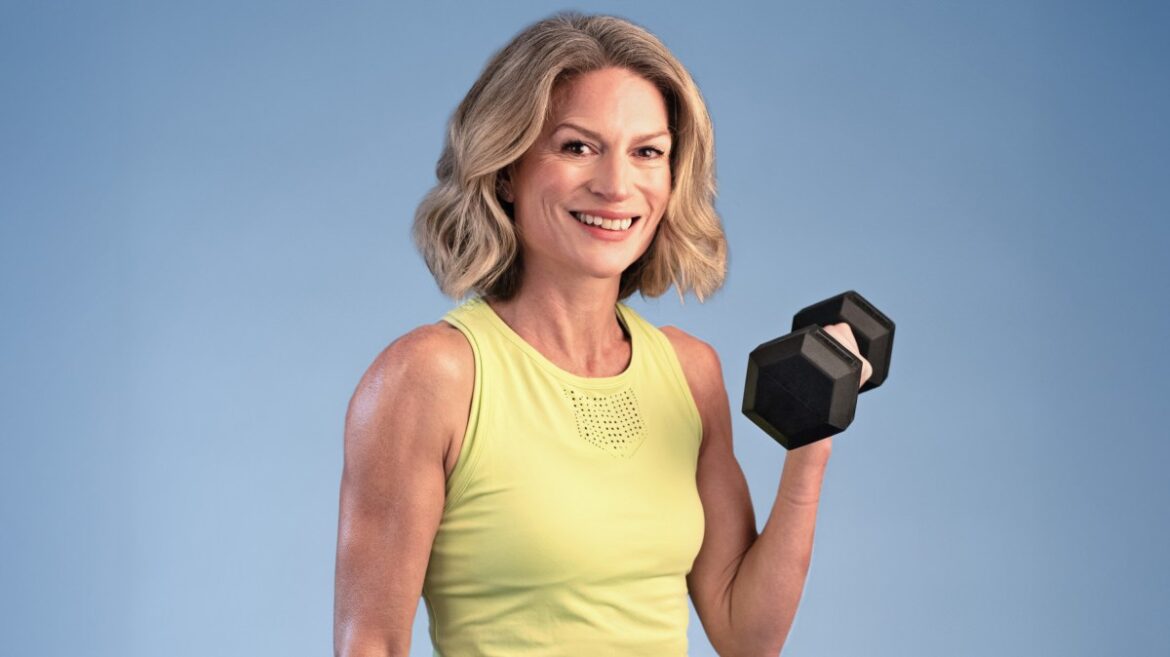Bodybuilders and athletes have been using creatine for years to add muscle and improve sporting performance. The former footballer Ian Wright described it as his “wonder drug”, the actor Mark Wahlberg fuels his 4am workouts with it and the wrestler turned actor Dwayne “The Rock” Johnson takes it to “put on size”.
Now, though, the focus has shifted to how the supplement might benefit the rest of us and, in particular, women in midlife — not only by honing our biceps but also, as research suggests, enhancing cognitive function by reducing brain fog. As one female influencer put it on Instagram: “Creatine. Not just for gym bros. Also for women who lift, rage and forget their car keys.”
As a 46-year-old exercise enthusiast who recently asked her son to fetch her a “hand trolley” after blanking the words for a shopping basket at the supermarket, I was intrigued. In February I bought a three-month supply of creatine monohydrate, the standard supplement form.
Although there is convincing evidence behind claims that creatine can build muscle, I am sceptical about supplement companies jumping on the perimenopause bandwagon, and my purchase was fuelled more by curiosity than expectation that it would stop me feeling perennially distracted or calling the kids by our dog’s name. At under £20 for three months for a daily 3g dose, it wasn’t going to break the bank. But would it help me to become stronger? And could it benefit my brain too?
How creatine creates energy, fast
Comprising three amino acids (glycine, arginine and methionine) and stored in our muscle and brain cells, creatine regenerates the molecule adenosine triphosphate, which is “the basic fuel the cells rely on to produce energy”, Professor James Goodwin, director of science and research impact at the Brain Health Network, says.
Creatine is naturally occurring — our liver makes about 1g a day — and about 95 per cent is in our muscles, the remaining 5 per cent in our brain. Provided that supplies are plentiful, “it’s easily absorbed into the muscle”, Goodwin says, and it delivers energy to muscles quicker than glucose and oxygen, making it particularly useful during the fast, explosive movements involved in weight training and high-intensity interval training (HIIT).
• How to start weight training in midlife
Can creatine boost memory?
Although Goodwin says the “critical mass of evidence” needed to show creatine improves thinking skills and attention is missing, “some studies have shown it does improve memory. These are fairly reliable studies but there are not many of them.” A 2022 systematic review found that creatine may support cognitive function and improve memory but “more research is needed”.
Dr Federica Amati, 38, head nutritionist at Zoe and nutrition lead at Imperial College London, says: “It seems to be good for cognitive performance, especially for people who are under sleep deprivation or high stress. If you’re going to an important meeting and you’re jet-lagged, creatine might help.”
Last year the journal Nature reported that a single 3.5g dose of creatine may “partially reverse” fatigue-related cognitive deterioration in sleep-deprived people after seven and a half hours.

Dr Federica Amati takes a creatine supplement regularly
DAIN RHYS EVANS
Is a creatine supplement better than increasing intake through diet alone?
There are no NHS daily guidelines for creatine, although research in the Journal of the International Society of Sports Nutrition found 3g a day may provide “significant health benefits”. This is considerably more than we typically eat — one study found that 70 per cent of American adults consumed less than 1g a day.
The amount of creatine in our cells “will probably decrease by about 1 per cent a year from middle age”, Goodwin says. “We know oestrogen is involved in creatine synthesis, so maybe that’s why [levels go] down if we’re perimenopausal,” Dr Elise Dallas, a GP at the London General Practice, says.
“If you eat another animal’s muscle tissue, you’re eating creatine,” Amati says. Herring is a particularly rich source, with about 1g creatine per 100g. Pork contains 0.7g per 100g, steak 0.7g per 100g and chicken 0.5g per 100g. If you eat cheese, choose parmesan — 100g contains 2.9g.
However, she says a creatine-rich diet can be high in saturated fat: “If you had a high-meat diet you’d be getting quite a lot of creatine, but there’s downsides to that kind of diet. In my view, creatine [supplementation] is a healthier way of doing it.”
Studies show athletes taking a creatine supplement perform better than those who don’t, whether they are eating plenty of creatine or not.
Older brains might benefit more from a supplement
A review last year in the journal Cureus found supplementation can reduce depressive symptoms, particularly when combined with antidepressants, “which is exciting”, Amati says, albeit with the caveat that more research is needed.
It seems more likely to benefit older brains. A 2023 study found no improvement in cognitive performance in young adults taking a supplement, but other research the same year revealed creatine to be particularly beneficial in improving memory performance in adults aged 66 to 76.
Dallas, 48, has been taking a creatine supplement daily since December. “I feel more alert,” she says. But she is also on HRT and takes a magnesium supplement that purports to improve cognitive function, so “it’s difficult to tell what’s causing what”. Goodwin, who is in his seventies, does not take it: “They’ve got chemistry to back it up. But having the evidence is a different story. The spin around supplements is so sophisticated that I’m very careful.”
Why middle-aged women should take it to beat muscle loss
Even if its brain benefits require more research, creatine has been found to prevent sarcopenia — muscle loss — which starts aged 30 and accelerates in women postmenopause, says Amati, 38, who takes creatine for “body composition and exercise performance” and because she’s “excited about its potential for brain health”.
One meta-analysis with 721 men and women aged between 57 and 70 found supplementation combined with resistance training led to greater lean-tissue mass. Another 12-month study found creatine reduced the loss of bone mineral density in 47 postmenopausal women.
“It’s likely that the cellular energy side will be helping the bone mineralisation process,” Amati says, pointing out that research also shows creatine can help with injury repair: “If you damage your muscle, whether marathon running or lifting weights, it improves the recovery. It speeds up the growth factors that allow the repair of the muscle.”
• How extreme is your daily routine? Ask the new health-obsessed
Creatine stimulates insulin-like growth factor-1, a hormone that helps muscle tissue to build, and inhibits a signalling molecule called myostatin that can stop muscle growth, she explains. “Studies show when you have the supplementation, you gain significantly more muscle mass compared with someone who does the same training but doesn’t take creatine.”
One six-week study found that creatine helped participants to increase the weight they could manage biceps curls with by 15 per cent. Meanwhile, research has found that creatine can improve performance in sports where explosive energy is needed, such as swimming, cycling and sprinting.
If you do want to take it, it doesn’t need to be every day
Some experts advise “preloading” with a larger dose of creatine every day for a week to reach saturation levels before taking creatine more occasionally. Amati takes 5g a day for a week every few weeks, then two to three times a week before strength training.
“I don’t think it needs to be every day,” she says. “Supplement companies like to say consistency is key, but I would suggest if you’re taking it two to three times a week you’re doing your body a favour.” Although research is unclear on whether the benefits of taking creatine accumulate over time, she believes “there is space for this becoming a supplement for taking for life”.
A higher dosage might be required to help cognitive function because the blood vessels that go into the brain have an “impermeable” lining that slows absorption, Goodwin says. For “potential cognitive benefits” the actor and bodybuilder Arnold Schwarzenegger, 77, suggested in his health newsletter “you likely need 10 grams per day”. Dallas agreed that “higher doses” (15-20g) may be needed “for brain saturation”.
You don’t need to buy expensive versions
Creatine monohydrate (there are other versions such as creatine ethyl ester and creatine hydrochloride, but they are significantly less studied) is sold in pill and powder form. My pills (Weightworld, £18.49, Amazon) are huge, stick to my throat and are such an effort to swallow, even split in half, that after a month of daily consumption my intake became more sporadic and I have since taken them once or twice a week. When I finish the bottle I will buy powder, which Amati, who puts hers in water, and Dallas, who dissolves hers in a smoothie for lunch, recommend.
Supplements sometimes contain added ingredients and can be pricey — Ancient + Brave’s creatine comes with magnesium and vitamin D, and costs £28 for 30 days; Momentous, the supplement company endorsed by Dr Andrew Huberman, charges £31 for 90 days. However, neither Dallas nor Amati — who describes creatine as a “cheap intervention” — sees any need to spend a lot, provided the product is third-party tested and contains no additives such as fillers and sweeteners.
• Meet your new midlife fitness guru: how to have a better body over 50
How quickly will it take effect?
Research has found that 2g of creatine dissolved in water is almost entirely absorbed in the blood within an hour. “In terms of exercise performance, it seems to be that if you take it today you’ll work out better today,” Amati says.
Evidence has yet to prove decisively whether it is more effective taken before or after exercise. I have tried taking mine at different times: before bed, at 5.30am immediately before exercise and after my workout seems to lead to my most energetic training sessions. Amati says there’s likely to be “a bit of a placebo effect”. I agree — when I’ve taken creatine I now expect to find it easier to lift weights, and it usually is.
Stronger but not sharper: how taking creatine affected me
Within a week of taking it I noticed my regular resistance training routine didn’t seem to require such a gargantuan effort. I felt more powerful — that I could push myself harder — and after about three weeks I added repetitions and increased my weights. While it hasn’t made my 10km runs feel any easier, it seems to help me expend more energy on HIIT Peloton rides.
Placebo effect or not, I am stronger than ever, but when it came to my brain it didn’t seem to have any effect. Granted, I’m not taking a high dose, but I don’t feel sharper at all. Four months on, it has not stopped me from losing my reading glasses and I still leave my car keys in the cutlery drawer.

